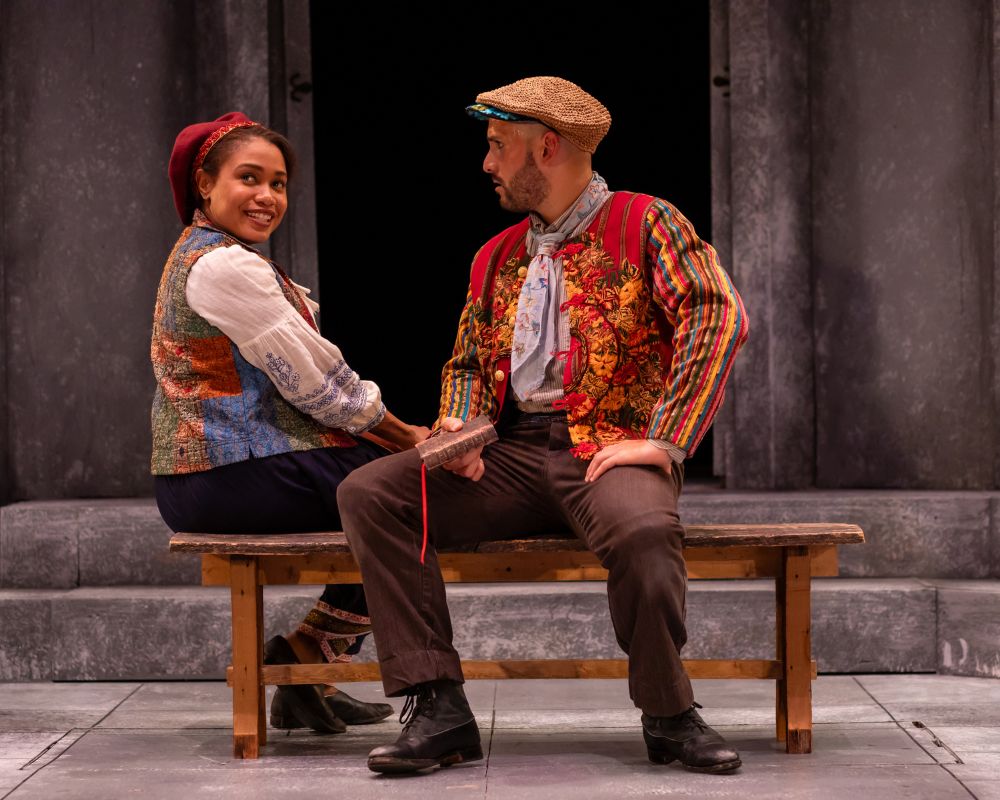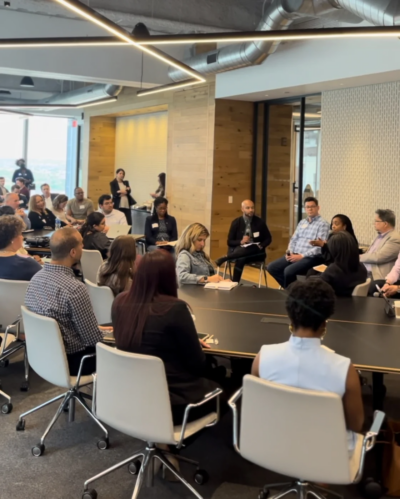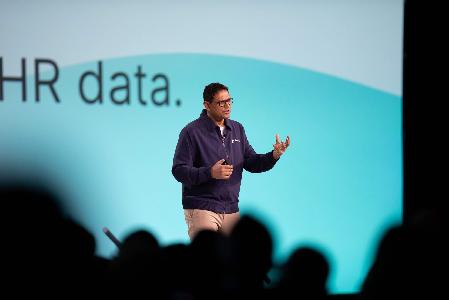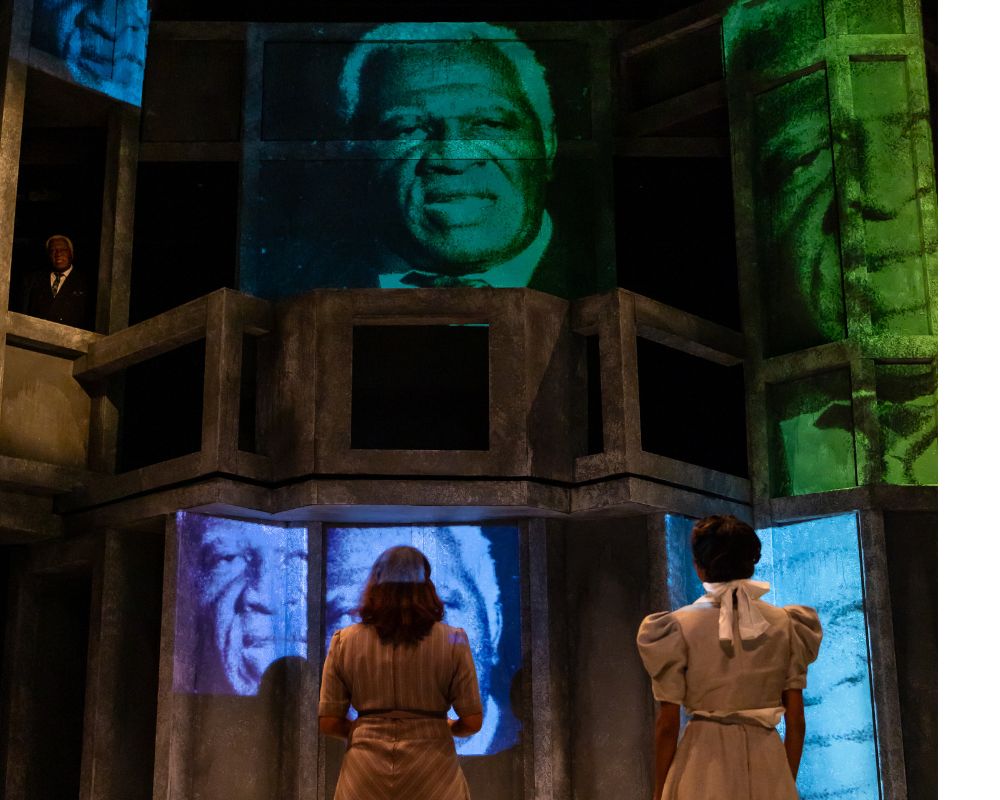
This editorial article is a part of The Tech Behind Month of Technical.ly’s editorial calendar.
Now, the 138-year-old Romanesque building at Redwood and Calvert Streets houses the Chesapeake Shakespeare Company (CSC) Theater. If you were to visit, you’d find a bank with an ornamental ceiling and a vault that holds a costume studio. (This evolution is quite fitting, considering that many believe Shakespeare was greatly influenced by the classical and Roman worlds.)
CSC has also added some technological advancements to its theatrical productions.
During an informal tour provided to Technical.ly, the depth of this company’s passion for the tech behind theatrical productions became evident as Chester Stacy, assistant technical director and facilities associate, and Dan O’Brien, technical director and facilities manager, shared insights on where CSC is technologically.
Lighting tech in modern classical theater
O’Brien introduced the company’s lighting history as in transition.
“We’re kind of in the middle of two technologies,” he said. “So there’s old theater technology, which is incandescent lighting. And you would have used gel, which is like colored cellophane placed in front of the light, to create different colors.”
As LEDs have become more popular in recent years, CSC has weighed how much it should use. It opted for a mix of some LED fixtures and some incandescent fixtures. To outfit the theater, CSC used ETC, which the technical directors say is widely known for providing theater lighting solutions.
In preparation for “As You Like It,” part of CSC’s 2023-24 season and running through Oct. 22, Stacy and O’Brien showcased modern light boards. “Lightboard operating used to be three guys in the room … throwing switches and moving things around depending on what scene they’re doing,” O’Brien said.
The theater’s older ETC Ion light board is about the size of six packages of Berger cookies. It has some light dings and dust on it.
Now, typically one person operates a pre-programmed control panel to orchestrate what could be described as a dance of light and shadow with the push of a button.
Stacy said, “I can bring the control of mood and to end an effect instantaneously at the speed required and at the moment required.”
In years past lightboards weren’t push of a button. They were reliant on a singular operator paying very close attention to stage cues without the help of automation.
Music tech in modern classical theater
Software made by Figure 53, a Baltimore software company, allows the CSC crew to manage sound similarly to lights. O’Brien knows Figure 53 founder Chris Ashworth and said he sat with Ashworth in his living room as he worked on developing the QLab software CSC uses.
“It’s as simple as hitting a button that says ‘go to the next one,’ eliminating the need for multiple levers and cable changes throughout the show,” O’Brien said,
Before a show starts, someone hired to operate the software takes a seat upstairs inside a room with a large glass pane with a view of the stage. The QLab MacOS software allows its user to play full-screen videos and images, or customize the geometry for projection mapping.
O’Brien explained the functionality of the music system for CSC: “You can combine any number of queues … almost like a symphony”.
In the past, music in a theater was predominantly a live and analog experience. The sounds of an orchestra, conducted by a maestro (like at the Baltimore Symphony Orchestra), were the primary means to experience music. Pianists, too, played a role, often providing solo performances or accompaniment with singers and other instrumentalists.
The digital age brought about the development of electronic music, epitomized by formats like MP3 files. The rise of recording technology made it possible to replicate a musical performance or a particular sound conveniently night after night in the theater.
Both O’Brien and Stacy concur that it’s an interaction between technology and the people on stage.

Rosalind takes refuge within the enchanting realm of the Forest of Arden, where she sits with Orlando in disguise, in “As You Like It. (Courtesy Chesapeake Shakespeare Company Theater)
Oh, the humanity — and the technology
When considering the impact of technology on classical theater’s future, Technical.ly’s interview with CSC raised a final question: How will technology shape this genre, with its potential benefits and drawbacks? While concerns exist about AI pushing out certain roles, the tech directors at Chesapeake Shakespeare Company view technology as a valuable tool under their control.
“I think there are two reasons why we go to the theater: familiarity and the wow factor. It’s about both spectacle and community,” Stacy said.
“The tricky part is that the spectacle piece of it can get old. It’s constantly becoming obsolete. … And I would rather see a show that nails the human connection and maybe doesn’t have the tech piece. Then I would see a show that nails the ‘wow’ factor.”
For that reason, O’Brien said, “I like tech where I am leading it, where I tell it what I want and what I need. And then there’s a tool that helps me do that. I don’t like tech when it is intruding into my life, when it’s like inserting itself where I don’t necessarily want it. I haven’t told Clippy to pop up and tell me that I’m writing a letter.”
There are no anthropomorphic assistants like Microsoft’s Clippit (better known as Clippy at CSC), but there is a full season of shows supported by tech ahead for the company theater. “As You Like It” is in a lineup of five productions, which also includes “A Christmas Carol,” “The Oresteia,” “Romeo and Juliet,” and “The Merry Wives of Windsor.”
Join the conversation!
Find news, events, jobs and people who share your interests on Technical.ly's open community Slack

Baltimore daily roundup: A gamer-turned-esports advocate; join Builders from afar; Backpack Healthcare's $14M Series A

Baltimore daily roundup: A network to empower Black leaders; AI's double-edged sword for music; UB pitches

Baltimore daily roundup: Data collection for community empowerment; UMD awards its innovations; chatting with Zara the AI bot



